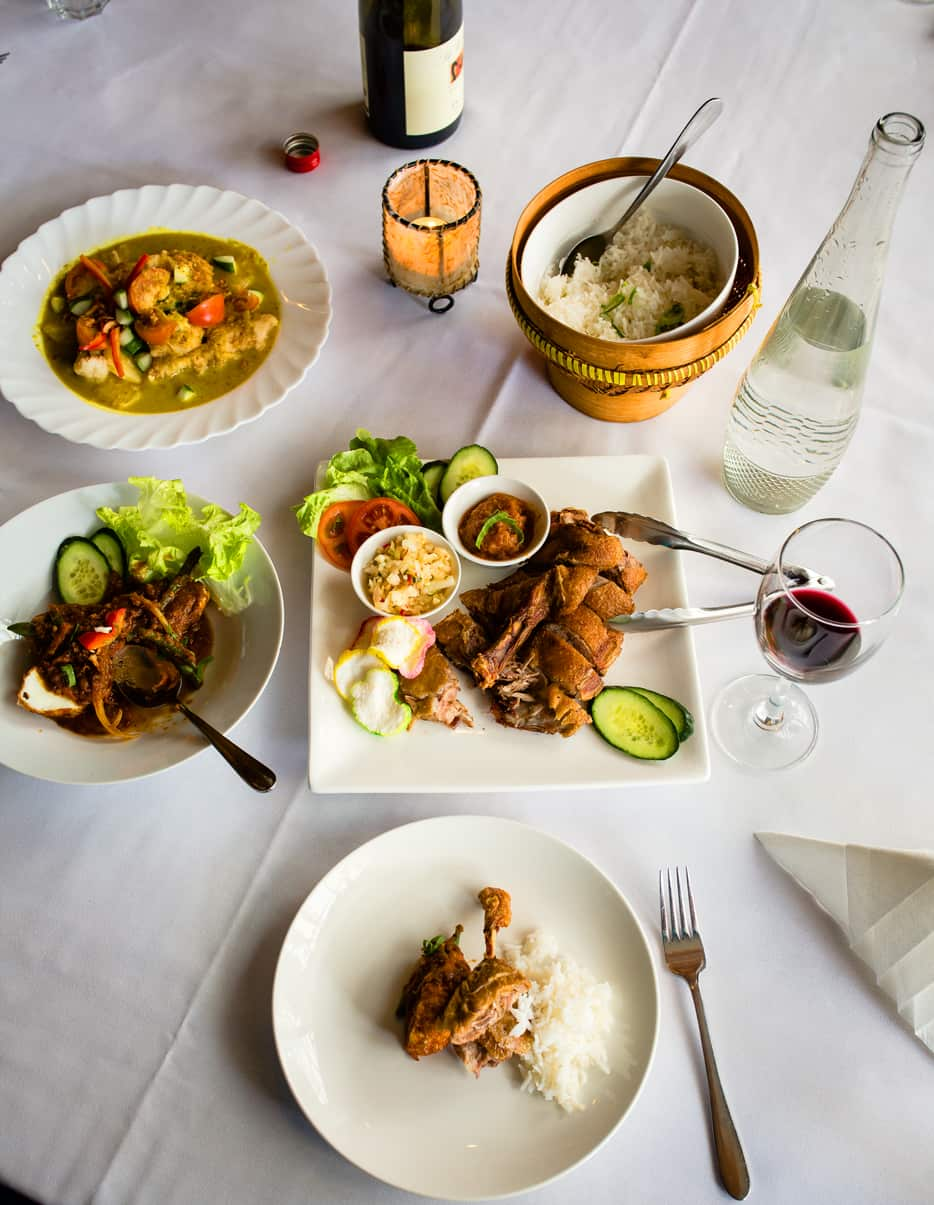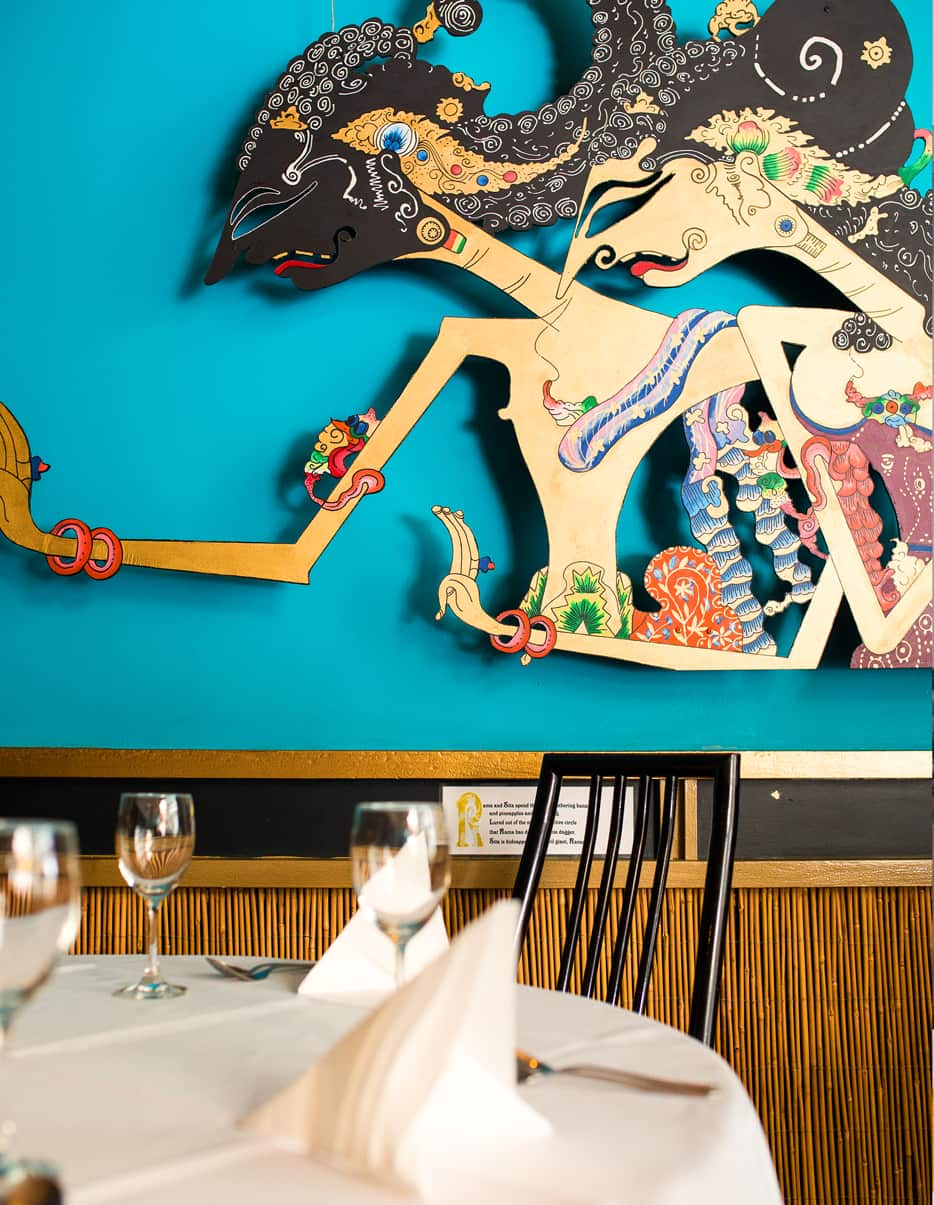Beef rendang, Chinese pork belly and chicken curries packed with red chilli were regular weeknight meals cooked by my grandmother when I was young,” reminisces Junaidi Djapri, owner of Adelaide’s Pondok Bali Restaurant. “It’s safe to say my love of food came from her.” Growing up on Bangka Island, an island east of Sumatra surrounded by stunning beaches and renowned for its tin and white pepper production, Junaidi was immersed in cooking from a young age. “Grandma’s recipes have been passed down from generation to generation,” he says. “The only real difference now is the modern gadgets – Grandma’s tools were the humble stirring spoon and mortar and pestle used to carefully grind and blend all the spices, which are unique to Indonesian cooking.”
While Bangka Island provided a relaxing lifestyle compared to the ever-popular island of Bali, Junaidi regarded Australia as a country of great opportunity. In 1975, when he was just 19 years old, Junaidi set foot in Sydney with the hope of improving his English at university. However, his time in the big city was short lived. “I had a lot of Indonesian friends in Sydney and we all spoke Indonesian to each other, which did nothing to help improve my English,” Junaidi explains. “So a close friend and I decided to move to somewhere less distracting; we were drawn to Adelaide’s comfortable lifestyle.”
Although Junaidi fell in love with Australian culture, he did struggle with its cuisine at first. “It was a bit of a shock at the time. I found the food to be quite bland compared to what my tastebuds were used to back at home!’’ he recalls.

Yet while he may have struggled with the lack of fiery spice in meat pies and chicken rolls, Junaidi had no trouble making friends in Adelaide. “I found it very easy to assimilate into Australian culture and have been fortunate enough to make wonderful friends who are very supportive and always ready for an ‘Aussie’ barbecue on the weekends or a boys’ fishing trip,” he says.
Junaidi worked as a computer consultant before opening Pondok Bali (Bali hut) in 1998. “I long had a dream of opening a little Indonesian restaurant in Adelaide as there were only a few Indonesian restaurants here compared with the amount in Sydney,” explains Junaidi. “The greatest inspiration was seeing the amount of Australians travelling to Bali. I wanted to give them the chance to experience Indonesian cuisine, a window into what they could expect on their trip. And for those who have visited the island, an opportunity to relive their experience in the comforts of their hometown.” The restaurant is traditionally decorated with bamboo and colourful parasols and has tinkling Balinese music playing in the background.
Authenticity is essential to Junaidi.

“I cook dishes that you’ll find throughout Indonesia and the food I remember from my childhood. Our menu highlights dishes from the regions of Sumatra, Java and Surabaya with a few safe crowd-pleasers, just to keep everyone happy,” laughs Junaidi, referring to the tasty lumpiah (crispy fried beef or vegetable spring rolls) and sambal goreng udang (chilli and garlic king prawns).
Australians may be familiar with South-East Asian cuisine, particularly Thai and Vietnamese, but strangely, the flavours of Indonesian cooking have been somewhat overlooked and much to our detriment. “Indonesian cooking has a beautiful variety of distinct flavours and native ingredients such as candlenuts, fragrant ginger flower and galangal. We are the masters of spicing foods,” says Junaidi. “Also, the technique for preparing food is key. Whether it’s rolling, grinding or pounding ingredients, a unique technique is applied to extract the greatest flavour possible.” Not all of the native flavours are as pleasing as ginger flowers, though.
With its strong, pungent smell, belacan (shrimp paste) can be an acquired taste, but Junaidi divulges that it’s essential for making the best sambal paste.
Indonesian cuisine is known for its interplay of flavour contrasts: sweet, sour, bitter, salty and spicy. These flavours can all be tasted in dishes such as ikan pepes (banana leaf fish), a fish fillet marinated in ginger, cardamom and cloves, then grilled in a green banana leaf. Fresh produce enhances the contrasting flavours and Junaidi sources fresh wherever possible. “We’re lucky to have one of the best produce markets in the country, the Adelaide Central Market. Sourcing the freshest seafood, meat and Asian ingredients is never a problem,” he says.

Nevertheless, good Indonesian cooking can be a labour of love. “Dishes such as our signature rendang daging sapi (dry beef curry) comes with an intensive cooking process; the beef, onions, spices and coconut milk are cooked for more than two hours and have to be continually watched and stirred until the meat becomes wonderfully soft and tender and the sauce has thickened,” explains Junaidi.
Sanur fried chicken is another popular choice on the Pondok Bali menu. Created by Junaidi and his former business partner, the charming blend of East meets West was named after the Balinese town of Sanur, popular with holidaying Australians who prefer the comforts of home with an Asian twist. The crispy fried chicken is served with a tangy sauce made from lime and kecap manis (Indonesian sweet soy sauce), and given more sweetness via a good kick of palm sugar.
It’s easy to see that Pondok Bali is popular with longstanding regulars, young professionals and the Indonesian community alike. “Our customers feel welcome when they visit, and regulars visit weekly for their fix of hot lamb curry or a fragrant bowl of laksa,” says Junaidi.
With all that chilli and spice, a little sugar fix is the perfect way to complete your Indonesian food journey. Try the dadar gulung, a green Javanese-style pancake filled with coconut, hints of cinnamon and plenty of palm sugar – it gets its verdant colour from pandan leaves. After this dessert, you’re certain to feel the warm sand under your toes.
310 Pulteney St, Adelaide, (08) 8232 0588 pondokbali com.au
Indonesian flavours around Australia
NSW
With stunning views of Walsh Bay and Sydney Harbour, Teras Bali may be the best place to enjoy fiery sambals and sticky rice pudding in Sydney. A number of dishes are offered, including babi guling – roast suckling pig that’s typically enjoyed at Indonesian ceremonies and festivals. It’s cooked with fragrant lemongrass, lime and a tomato-chilli paste, and served with glistening shards of pork crackling. Shop 2, 17 Hickson Rd, Walsh Bay, (02) 9251 9265
QLD
A contemporary and calm setting in East Brisbane, Green Papaya serves up a mix of both Balinese and Thai-style dishes.A sweet and sour tamarind snapper with crispy ginger and a tender beef rendang with roti are the Balinese highlights, and the varied menu balances sweet, sour, salty and spicy flavours. 898 Stanley St, Woolloongabba, (07) 3891 5000
VIC
Garamerica
Popular with students, this cosy Indonesian restaurant dishes out hearty bowls of rawon (an aromatic East Javanese beef soup) and martabak telur (savoury Indonesian pancakes). Flavours are fiery and dishes are generous in size. Try the es teler, a creamy dessert of coconut, jackfruit, avocado and condensed milk over crushed ice. 230 Dorcas St, South Melbourne, (03) 9696 2192
Photography Tom Donald.
As seen in Feast magazine, July 2014, Issue 33.
SBS Food is a 24/7 foodie channel for all Australians, with a focus on simple, authentic and everyday food inspiration from cultures everywhere. NSW stream only. Read more about SBS Food
Have a story or comment? Contact Us

